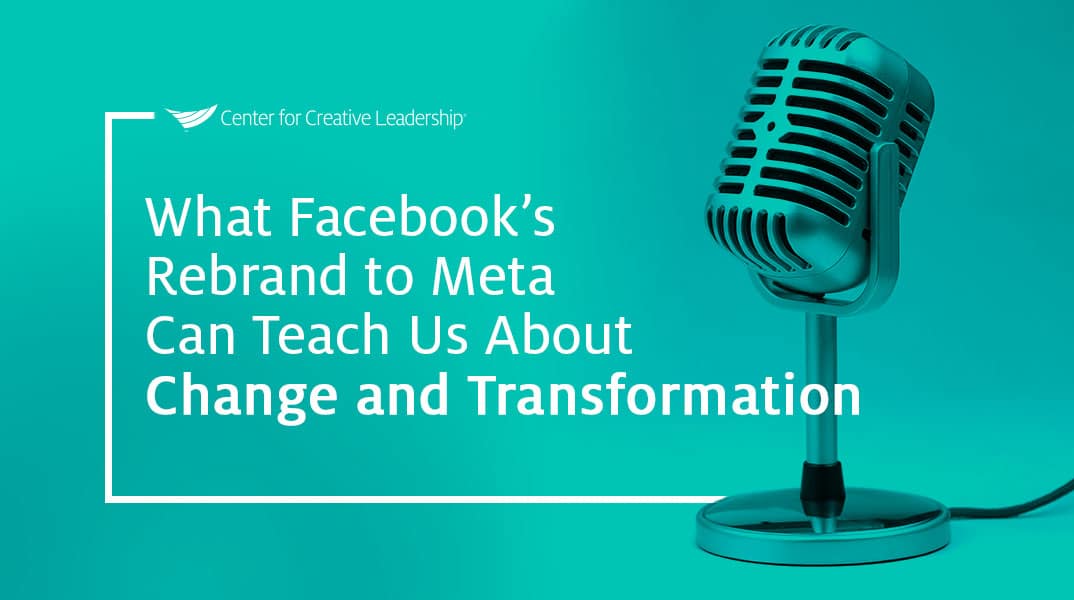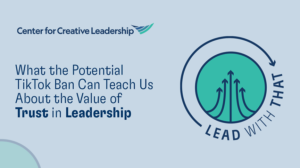- PODCAST
Lead With That: What Facebook’s Rebrand to Meta Can Teach Us About Change and Transformation

In this episode of Lead With That, Ren and Allison explore what we can learn from Facebook’s rebrand to Meta.
Facebook — a company that changed the way the internet was used and the way people connected with one another — recently announced their rebrand to Meta. What are the practical implications of a prominent company changing its name and its mission, and how can we examine the shift from a leadership perspective?
In this episode we’ll dive into the way an individual’s leadership brand can impact their influence, and how leading change and transformation requires direction, alignment, and commitment. We apply what we know about change to what we see happening with Facebook’s transformation and how we can lead with that in mind.
Listen now or read the full transcript below.
Listen to the Podcast
In this episode, Ren and Allison explore what we can learn from Facebook’s rebrand to Meta.
Interview Transcript
INTRO:
Welcome back to CCL’s podcast Lead With That. We talk current events and pop culture, we look at where leadership is happening, and what’s happening with leadership.
Ren Washington:
Allison, it’s almost here. Well, sort of, but if you squint, you can just barely see people putting on their VR glasses, talking to Alexa and Cortana about a coffee mug they just saw, or directions to their favorite new barista they found on Yelp. And if you listen closely, you can even hear the screams of dismay and horror from people worried about this new Meta world order. People who desperately miss the Dewey decimal system.
But here at the podcast, we just want to talk about the practical implications of a company changing its name and its mission, but not just any company. One that has only ever been known by one name, a name that changed the way the internet was used and the way people connected with one another. By now, listener, you maybe guessed that we’re here to talk about Meta, the artist formerly known as Facebook, and looking at the shift in the name and the meaning of Facebook, especially from a leadership perspective. We’re really curious about the lessons we can learn from Mark Zuckerberg, from Meta, and how that all applies to any shift in brand or behavior. So welcome back everyone. I’m Ren Washington, and as usual I’m joined with Allison Barr, and Allison, I’ve got to know. What are three words that come to mind when I say Facebook?
Allison Barr:
Immediately, the first three words that come to mind are I’m locked out. I’ve been locked out of my Facebook account for about a year now, but if you want me to keep this relevant to our podcast, I would say the first three words that come to mind when you say Facebook are “ahead of trends.”
Ren Washington:
What do you mean, you’re locked out? You can’t get back in?
Allison Barr:
Can’t get back in and it’s a whole… It’s a perfect storm. It used to be connected to my phone when I lived in London, and then, it’s a boring story that doesn’t matter, but I’ve tried every trick you could think of from all of my tech friends to get back in, and it’s a lost cause.
Ren Washington:
We should revisit that, because there’s some implications of that with Meta and the Metaverse, but to stay on focus. So what were the last three words? The second three words, part two that you said?
Allison Barr:
Part two, ahead of trends.
Ren Washington:
Ahead of trends, and what an interesting frame as we look at Meta. It’s still weird for me to say. But this new organization that we were introduced to, that Facebook is just a part of, and so ahead of trends. How do those three words map to what you’ve learned and heard about Meta?
Allison Barr:
Well, I actually want to back up to Facebook as its original concept when it was introduced to the public before it is what it is now. People did not believe that it could be such a successful platform. They didn’t see it working, people knocked it, and now it has over a billion users. And as you can see, Zuckerberg’s financial success came with that. And so Metaverse, what’s interesting about Metaverse is that it’s in some ways being introduced in the same way. Nobody even knows what it is, right? Like it is not a product yet. It’s a rebrand, but people don’t necessarily know exactly what it is. And there are some people who will say that it’s not going to go anywhere. However, I question that because of Zuckerberg’s success with Facebook itself. No one thought that was going to go anywhere either.
Ren Washington:
Yeah, and he is committed. I was reading about it and some would say that Meta is just the outward appearance of something that’s already been happening behind Facebook doors for many years. I mean, this year alone, something like $10 billion has been committed to Meta and the Metaverse. And so it raises some interesting conversations for us I think, as we look at what it means to change and transform. How you can be a leader to embrace change or transformation, or break down silos to build some kind of new innovation. And all of that sounds really interesting and sounds good, but there’s a lot more to explore I think. Many more complexities as we think about the implications of what Facebook was and what Meta promises to be.
Allison Barr:
Yeah, and I think when I reflect on the difference… Well, I’m sure there’s many, but one difference between Metaverse and Facebook is that, from what I understand, Metaverse is intended to be a place where people can connect very similar to what Zuckerberg has always said about Facebook’s intentions. However, this is essentially going to be virtual reality and virtual reality also isn’t necessarily new. I mean, you’ve alluded to that already, but gamers have been doing that for years. And why hasn’t that caught on? So is it going to have the same traction as Facebook? Are people going to be ready and excited to enter into a realm of virtual reality?
Even at the workplace, he’s alluded to this translating to the workplace, like virtual meetings in which I can have an avatar and have a creation space with you where we never have to set a foot in the office again. Are people ready for that? Is it going to have the same traction? It feels almost dystopian to me.
Ren Washington:
Or utopian. Have you ever heard of the book or seen the movie, Ready Player One?
Allison Barr:
No.
Ren Washington:
Okay. Well, there’s a lot of direct connections between that world and this world, and Ready Player One is a world where people put on their VR headsets, inhabit an avatar and exist in this digital world. And the digital world is this shiny glitzy glammy place that you can do anything and be anyone. In the real world, it’s much more somber. And so a little dystopian. But there’s a couple of things that you say there. One, that I want to answer your question, are people excited? Will it get traction? I think there are people who are excited, and maybe just as many people who are really horrified at the idea, and so, which I think brings up the second point, some of which we’re talking about now is…
So Meta is the company. The Metaverse is the set of virtual spaces where people can create and explore with other people who aren’t in the same physical space as them. Now that’s according to Facebook before they made the Meta transfer. So Meta is the new parent company of Facebook and underneath Meta is Facebook, is Messenger, Instagram, WhatsApp, and Oculus. And so the Metaverse itself, I think if people are, if it comes to fruition like they’re talking about, it’s where people will be able to wear their VR headsets or AR headsets and immerse themselves in the places they are or that they want to visit. And they can interact with other avatars who kind of just hop into their field of vision, or explore a new city, or look at a building or a restaurant and see the Yelp review.
And going back to your question, are people ready? I think they’re maybe more ready than even we might anticipate, especially if you think of the internet of things, or which was later turned into the internet of everything. Are you familiar with those terms?
Allison Barr:
Yeah. Yes I am. And it’s interesting that you bring that up because what I understand Meta will do is run on its own hardware. So no company will be able to tell it what to do anymore, and I think that’s an interesting perspective on all of this. So I wonder if the rebrand has more to do with being able to be its own entity now. So like Facebook has to rely on Chrome and Safari. It has to rely on the interwebs. It has to rely on Apple to some extent, and there’s been some tussle between Apple and Facebook in the past. And now it’s looking to be its own entity where it literally is going to run on its own hardware as well, which I find that to be fascinating.
Ren Washington:
See, now that’s news to me. So we’re saying that Meta, the organization that parents Facebook and all these other things, they’re going to create their own like operating system to have stuff running on it?
Allison Barr:
That is the intention.
Ren Washington:
Okay. See, now the plot thickens.
Allison Barr:
The plot thickens.
Ren Washington:
See, I tell ya. It makes me think of, I had a question while I was doing this. I’m like we talk about leadership brand and reputation at the center and I think we’ve talked about it on the podcast where brand is what you want to be known for and reputation is what you are known for. And Facebook is known for a lot of things, frankly I thought you were going to say something different when I asked what are the three words that come to mind when I think about Facebook because for me, one of the first one’s old, out of touch are some of them, that’s like one inside three, archaic.
And so Facebook seemed to be such this old thing, the kids and I joke about it all the time. None of the kids and their friends are on Facebook, they’re on TikTok as you know, Allison that’s how you’ve reached audiences, or the Gram or something like that. So I think, “Okay, well they rebrand,” and I think anyone who grew up with Facebook who was looking at it, they might be, “Oh no, is my favorite brand changing?” And then people who didn’t grow up with it might be looking at it like, “Yeah, right. Whatever Meta, we get it. You’re Facebook.” And so it’s kind of like does it matter if you transform or embrace change if no one cares or if no one believes that anything’s going to be different?
Allison Barr:
Facebook I think is needing to reach a younger consumer. I think you’re right about that. And TikTok now is one of their competitors. So what’s also interesting is that Mark Zuckerberg got a brand ambassador. I don’t know if you heard about this, but one of Meta’s brand ambassadors now is one of the biggest TikTok stars who has over 200 million followers. He makes money now. It’s his job. Right? So Zuckerberg has enrolled this younger generation ambassador to be the face of this movement. It really does feel like a movement. However, that has not caught traction. I did not know that. Had you heard about that?
Ren Washington:
No, I’m like what’s this kid’s name? Let’s give him a bump. The famed lead with that bump.
Allison Barr:
Am I terrible that I don’t… I’ll find it by the time we’re done.
Ren Washington:
All right. See, don’t don’t judge us audience, as evidence by our bump, we can’t even name the people that we’re trying to highlight. I love it. I love it. Well no, that’s what I mean. I didn’t hear about it. So again, because it’s Facebook, it’s Meta. I kind of shrug my shoulders at all of this even if they pander to me with this new TikTok star. So I wonder how long it’ll take for this brand to be adopted, especially when from the outside, it seems like Facebook changed its name. From the inside, it’s really this idea that Facebook is one of the applications that this larger cultural changing system, idea, company is a part of.
And so when I think about their brand that they’re trying to inhabit, this idea of that connectedness, this virtual experience. But then when I think about the Facebook whistleblower and the echo chambers that existed to propel capitalist gains versus societal harmony, I’m like, “I don’t know, do I want a VR world that allows me to thumbs up my favorite dissenting figures that are polarizing the world or look at even more realistic and violent things?” Now this is a slippery slope for me, but curious around what they can do to overcome that perspective.
Allison Barr:
Yes, so when you asked me that question, what are the three words? As you already saw, there were more than three words that came to mind. And I also thought about the whistleblower case. It’s not uncommon for companies to rebrand when they’re amidst a bit of a crisis. And so part of me wonders about the timing and I also think about… What immediately came to mind as well it the movie Wall-E. Have you ever seen the movie Wall-E?
Ren Washington:
I have. I’m excited to hear what comparison.
Allison Barr:
I love that movie. So Wall-E, if you haven’t seen it, is a children’s movie. And I used to watch it a lot. When I was in my early 20s, I used to babysit for these two boys and we used to love watching Wall-E together and we stopped watching it because one of the boys who was probably five or six at the time, he kept getting so upset to the point where he couldn’t watch it anymore. And he kept saying like, “Where are all of the people? I don’t understand.” And if you haven’t seen the movie, all of the people on earth are gathered up on a spaceship type looking unit and they’re entertaining themselves in a virtual type of simulation because they had essentially ruined planet earth and made it unlivable and so robots are taking over earth trying to find something that will grow.
All of that to say, I don’t think that Zuckerberg is going to replicate Wall-E, however, I wonder if the world is ready to normalize virtual reality in the way that I think he’s alluding to. He did say that he sees this playing out, I already mentioned this, in the work world, in family spaces, friendships, social spaces. I don’t know about you Ren, but I would much rather see you in person than see you in a virtual space. I would much rather see my friends and my family in person and at a last resort, if it’s my only option, sure I’m going to Zoom call them. But I’m just not sure if this is what the people want so to speak. It might be what some people want.
Ren Washington:
Well let me press you a little bit here. Let’s say we couldn’t see each other in person, but we had the capability, you and I, to actually go for a walk together. All we had to do were put on glasses that looked like yours right now and we could walk down the street together and you turn to your right, I’d be there. I’d turn to my left, you would be there. And we would be walking down our own individual streets, but we would be together. Does that sound like something you’d be interested in?
Allison Barr:
So I’d be lying to you if I would say I wouldn’t try it, I would try it. And I don’t think I would like it. I really don’t. If I’m going to take a walk and we can’t see each other, but maybe I can call you or something. I want to see the actual world around me. I don’t want to detach from reality. I don’t want to. I would call you or FaceTime you and be like, “Look at this cute house.”
Ren Washington:
I feel like it’s the same thing. If you FaceTime me, you’ve got your phone held up in front of me so I can see you and you can see me, right?
Allison Barr:
It’s not virtual reality though. You’re seeing what I’m seeing.
Ren Washington:
No, this one would be more like an augmented reality where you and I would be walking and you would have your glasses and you’d be seeing the world in front of you. And then to your left, when you panned your head would be a projection of me. So you wouldn’t be walking in your home, you wouldn’t be walking blindly down the street. You’d be walking down the street seeing everything that your street has to offer, except I would be an added projection. Have you ever played Pokemon Go?
Allison Barr:
No, but that sure blew up didn’t it? I played it with the kids once, but I’ve never chosen to play it for myself.
Ren Washington:
That’s all right. So for anyone who’s curious, what’s the difference between virtual reality and augmented reality. So what I’m talking about is an augmented reality where you’ll see augmented reality apps, any kind of filter on Snapchat or messenger, that’s an example of augmented reality where your camera, the lens shows on you or something around you and it shifts what sees. Like my mom, one of my favorite pictures of my mother was she was wearing a turkey hat on Thanksgiving. It was an augmented Snapchat thing and the turkey wiggled and wobbled on top of her head. It was like a digital asset that was projected onto her.
So Pokemon Go was like that. You’d have your camera up, it’d be looking out the world and then you’d go point it at like a swing set and on the swing set would be this Pokemon over there or this small little animal you could capture. So that’d be sort of the same idea here that I’m suggesting. So I would say, and maybe we shouldn’t think about other people, are they ready, we should talk about are you and I ready for a world that’s full of virtual Meta connection and augmented reality? And if not, what’s in the way? So I get the sense that you don’t think people are ready or maybe you aren’t interested. Why and maybe what are the implications of that on a brand shift such as this?
Allison Barr:
So is the question why I’m not interested?
Ren Washington:
Yeah, that’s part one of the question. I double barreled you and I shouldn’t have, but yes. First part, thank you. Yeah, first part, why are you disinterested if you are?
Allison Barr:
Because I like seeing people in their normal, natural state. I don’t mean to sound flippant. I’m being serious, and there’s research behind this too. There’s research around there are health benefits to being in person with people. The pandemic has cost people that luxury. And it’s a basic need. I don’t want to have augmented reality. I want to have reality. I like it. I like it here Ren.
Ren Washington:
But no one’s keeping you from the reality. It’s just augmented.
Allison Barr:
Right, but why I’m saying, let’s say it trickles into the workspace, right? You and I don’t live in the same space, but what is the benefit to me to choosing to be in the metaverse with you versus on a Teams call? I can see you right now. What is the difference? Why would there be a benefit?
Ren Washington:
Well, I think that raises a lot of interesting questions, and I don’t entirely know if I have an answer to that. I could argue that if there was a conference room that we could all walk to, we could go there and we could put our goggles on and we could feel like we were in the same room, even though we weren’t, so you might have me there. Now I’m trying to think of other reasons why you might want to interact with someone like that, like my going for a walk example, another way to stay connected.
I could imagine if you were in more of a virtual or augmented set where I needed access to a file or document, and maybe I was able to connect to that in a more seamless way, which Meta might try to do, sort of like the internet of everything enabled us to do. If I wanted to see how many calories I burn, I can go to a website. Maybe now, if I want to see what’s on your outbox pile, I could put on my glasses and look at that. I don’t know. Do people still have outbox piles?
Allison Barr:
No. I don’t even know what you mean by that. Again, how is that different, though? You can go to the ODrive right now and do the same thing.
Ren Washington:
Yeah, but it takes forever.
Allison Barr:
No, it does not.
Ren Washington:
Okay, fine. You’ve got me there, then. I mean, I’ll give you that one. You just don’t see the value in it, is why you’re not on board?
Allison Barr:
That, and I don’t know what it is. I cannot conceptualize it. That doesn’t mean that I won’t be on board. However, Zuckerberg has been clear about this. It’s a work in progress right now. You already said it. They’ve committed 10 million or 10 billion, maybe, dollars alone already to it. It’s coming, and we don’t know what it is. Have you seen the commercials, or did you see his 90-minute speech about it?
Ren Washington:
I have kids. I haven’t seen 90 minutes of anything.
Allison Barr:
Fair enough.
Ren Washington:
Except for a Disney movie. That’s not true. They watch cooler things. I have seen some of it, and I’ve seen him getting raked on the internet.
Allison Barr:
Yes. I mean, it’s not like Nike’s coming out with a new shoe and I can conceptualize that, right? This is metaverse, okay? What is that? All I know is that it was based on a book called Snow Crash, which is a sci-fi book. I know what he’s said about it, and I’ve seen the commercial where there’s some teenagers in an art gallery and they’re looking at the painting, and then all of a sudden they become within the painting. Sure, that sounds fun, but it’s no different to me than playing a video game, which that’s not where my interests lie.
Ren Washington:
I feel like I could see you standing on your lawn and your fist in the air, shaking it, like, “Get off.”
Allison Barr:
Don’t. Don’t you say it. I am not a get-off-my-lawn kind of person.
Ren Washington:
I feel like I’m hearing you say, “The internet is a series of tubes,” like I’m talking to Orrin Hatch.
Allison Barr:
No, I just don’t know what it is. It’s a product that is coming, that I don’t know what it is.
Ren Washington:
Yeah. Well, I think it’s really interesting too, because that was something I was reading around this idea, much like you said with Facebook, where Meta exists without yet the product or an ecosystem that it needs, really. I dabble here and there in cryptocurrency. If any of you are listening who are really interested, you’ve probably been hearing the trends that crypto gaming is the next frontier. It’s really deeply embedded in the metaverse, all of these ways for you to actually do real pay for win. You buy digital assets. Someone just sold a piece of digital land in a game for $2.38 million. We’re not talking about small things, as things have these interesting pieces of value, like NFTs do now in certain pockets.
All of this is so fledgling, so new. Many of these games, even in cryptocurrency, aren’t even built yet. They’re still in alpha stages. Meta exists without really yet a metaverse for it to exist in as it sees itself, as its ideal existence. For me, I think the biggest advantage it has for the brand/reputation conversation, for helping people continue to embrace change or transformation, is really I think it’s closer to you than you think it is. I asked you about the Internet of Things or the internet of everything. Are you an Apple or a PC user, or Apple or Android?
Allison Barr:
Do you mean my phone? Are you talking about my phone?
Ren Washington:
Yeah, if that’s not too proprietary.
Allison Barr:
I have an iPhone.
Ren Washington:
Okay, iPhone. Apple long has done this integrated experience where what you save on your computer, you save on your phone, your iCloud, and so too does Google, right? My Google Chrome, when I sign in on Google on all my Android devices, it’s as if I’m using my desktop Chrome and vice versa. It’s got all my Google Drives. It’s all synced up together, which could be synced up to my food ordering accounts, my GrubHub, my Zoom. All of this stuff is already woven together. For me, the only difference is that I don’t have goggles that I put on to interact with it. For me, the metaverse, and then too, Meta, the value it brings is the value that a designed ecosystem like the cloud or like Android Alexa, how those all sync and work together in smart homes, that seems like just Meta now.
Sure. I mean, perhaps, right? Again, I don’t know that it’s going to engulf people in the way that you might be saying. I think a lot of people will really like it. Do I think it’s going to be the way of the world? No, I don’t, but I don’t know. I don’t know. One perspective I have on this, though, is that I think it’s a bold move and I think it’s a strategic move to announce a rebrand along with a product … I’m air quoting, because it is a product in some respect … while allowing for his customers to adjust to the idea. By the time that product launches, the public will have been expecting it. It’s a bold move. To make a strong claim that you’re the leader in connection via virtual reality without even doing it yet, I like it.
Allison Barr:
In terms of branding, we talk about this at CCL too. You have to know what you want your leadership brand to be before you try to create one for yourself, and it’s the same for companies. Again, his ideas aren’t new either. These are not new ideas. However, Zuckerberg and his company are claiming them boldly as theirs, so that they can start to be consistent in being that, by the time the product unveils.
Ren Washington:
I love that frame, because that’s the root of what we talk about brand and reputation, brand being aspirational. A big part of being able to articulate and aim towards a brand is really highlighting and targeting what you want it to become. I do think that the transition for Meta is a chance for a warmer launch when the metaverse comes knocking at our doors. We’ll be a little bit more familiar with this infinity loop, as their new logo suggests, of all these interwoven and connected ideas.
I think, just the same way that people in Facebook have known about this, I guess the Meta name changes have been happening for six months in clandestine corners, behind closed doors with ironclad NDAs and all of these things. I know, it’s very woo-woo. I imagine they had to do some of the same kind of cultural shift and recalibration internally.
Whether or not we agree or see the value in the metaverse or in Meta, I think as one aims to lead change or transformation, it might help to, A, quantify and qualify what the new transformation looks like, and then B, really own it and say it to the world, like, “This is what we’re going to do.” I mean, talk about public accountability. We’ll find out. One way or another, I promise you, we will find out.
Allison Barr:
If you think about it strictly from a marketing perspective and strictly from that alone, they do need new guest acquisition. They need new client acquisition. It’s the right time to rebrand. They’re also in the midst of a bit of a crisis. Strategically, I’m not sure if this is part of it.
I don’t know, but they could perhaps use some deflection. And I love what you just said because I was listening to a podcast in which Zuckerberg was interviewed. I listened to it this morning and he was asked, “How do you communicate something so big like this, and ensure that the company is aligned and ensure that people stay on track?” And what he said, his exact words sounded a little bit familiar to me. So I’m going to see if it sounds familiar to you as well. He said, and I’m quoting him here, “We do this by setting priorities and principles, communicating clearly internally and then externally. And then we also need commitment.” And then he said, “When we say it externally, this states a level of commitment that is our stake in the ground we’re committing to the public as well. And that’s how you let everyone, including your company, know how committed you are.” Does that sound familiar to you? Those three steps?
Ren Washington:
It sounds like those are outcomes of effective leadership.
Allison Barr:
Right.
Ren Washington:
Those sound a little interesting around maybe a little direction and some alignment and then some larger commitment. Is that what we’re?
Allison Barr:
Yes. Yeah.
Ren Washington:
I thought you were going to tell me, he sounded like beep boo beep bop.
Allison Barr:
No. A little bit.
Ren Washington:
Yeah, that is curious or maybe not curious but funny and well, do you agree despite where we know it’s founding, what do you think about that?
Allison Barr:
Well, yeah, look, Zuckerberg and the company also have a very solid financial cushion and he has not disappointed stakeholders. So his stakeholders are, I’m sure, very happy to be moving forward with him because of his consistency, which is part of branding as well. But when you set direction and you have alignment on how you’re going to get there within the company, and then you commit to it, those are essentially what we talk about here at the center of the outcomes of effective leadership. And so I thought that was an interesting parallel and I do love his bold statement about if we commit to the public, then everybody knows what we’re doing and we’re doing it. It’s happening. We’re doing it.
Ren Washington:
Yeah. For me, that really is my major takeaway for all of this is when we think about our branding or that piece of it, it’s some of it is tell your story and keep telling your story. Whether you’re telling the narrative, someone else’s, so you better get your hand in there and be weaving that tale and I think how we create some alignment around that with some clear direction and then doubling down on the commitment is that idea of just make sure you know where you’re going. And also make sure that you know what your reputation is because you could sing your praises all the way to the river and back. I don’t know what I’m saying. You could sing your praises all day and it wouldn’t matter if people think one thing about you. So it’s keep telling your story and then make sure that as you’re telling your story, you’re doing actions and behaviors that align with the aspirational brand that you have and make sure that your reputation and your brand are closer together.
Allison Barr:
Yeah. Consistency. Yeah. I think for me, well, and first, as I promised, I would find that TikTok handle before we were wrapped here, and this gentleman’s name is Khaby Lame L-A-M-E. And he’s a comedian. He has over 200 million followers. He’s the second highest account on TikTok. And that is who Zuckerberg pulled in to be the ambassador, so to speak. So check out his TikTok.
Ren Washington:
Okay.
Allison Barr:
Bringing it back to organizational takeaways though, it always makes me think of the people within organizations who are visionaries, the ones who are ideators, the ones who come to your meetings and say, “What if we did this?” And most people are going, “What?” Those people who do have their finger on the pulse of what’s coming, I think to those leaders within an organization who are listening, if that is you and you do want to get buy-in on your ideas a little bit faster, I think you can focus on that, getting clarity around the direction. This is specifically what I want to do. This is specifically how we’ll get there. And I’m committed. Are you on board with me? So there are certain steps into selling your ideas that do come along with your reputation and your brand. But I do think when you have those types of people in the organization, sometimes they can become stifled if the organization isn’t ready for new ideas. So, I guess I’ll leave us with that. If you are the visionary in your company, see if you can simplify your ideas and create those three pathways, so people can have a better idea of how you’re going to direct the company towards that vision.
Ren Washington:
Yeah. And try to get people to stop yelling at you for being on their lawn.
Allison Barr:
You can be on my lawn anytime.
Ren Washington:
Thanks.
Allison Barr:
Anytime.
Ren Washington:
Thanks buddy. I appreciate you. And I appreciate this today. I feel like we can talk about Meta and Mark and all those things a lot more, but this was fun.
Allison Barr:
Yeah. This was fun. So thanks for the conversation, Ren, and thank you always to Ryan and the CCL marketing team for making our podcast happen. And as always, you can find our show notes and links to all of our podcasts episodes on ccl.org. You can also find us on LinkedIn or the TikTok world. For me, at least I don’t think Ren’s on there, but we do look forward to catching you next time.
Ren Washington:
That’s right. Thanks a bunch, everybody. See you next time.
| What to Explore Next
| Related Solutions
Sign Up for Newsletters
Don’t miss a single insight! Get our latest cutting-edge, research-based leadership content sent directly to your inbox.







